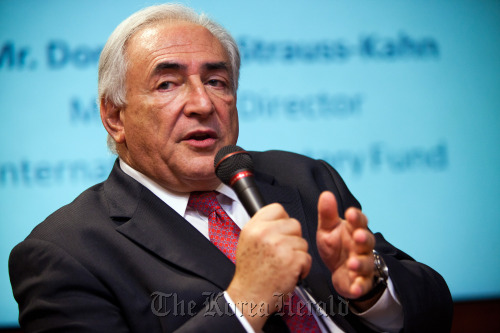IMF chief urges bigger global role for yuan, emerging economies' currencies
WASHINGTON (AFP) ― IMF chief Dominique Strauss-Kahn on Thursday said the currencies of China and other emerging economies should play a greater role in global finance, as part of a bid to promote monetary stability.
Strauss-Kahn, the managing director of the 187-nation International Monetary Fund, backed the inclusion of the yuan in a basket of currencies that makes up the IMF’s Special Drawing Rights, a type of reserve currency.
Strauss-Kahn also advocated an expanded role for the SDR to help bolster the monetary system in the face of damaging volatility.
Noting the only way the world survived the 2008 financial crisis was through extraordinary international policy cooperation, he warned: “Global imbalances are back.”
WASHINGTON (AFP) ― IMF chief Dominique Strauss-Kahn on Thursday said the currencies of China and other emerging economies should play a greater role in global finance, as part of a bid to promote monetary stability.
Strauss-Kahn, the managing director of the 187-nation International Monetary Fund, backed the inclusion of the yuan in a basket of currencies that makes up the IMF’s Special Drawing Rights, a type of reserve currency.
Strauss-Kahn also advocated an expanded role for the SDR to help bolster the monetary system in the face of damaging volatility.
Noting the only way the world survived the 2008 financial crisis was through extraordinary international policy cooperation, he warned: “Global imbalances are back.”

Issues that were worrisome before the crisis ― large and volatile capital flows, exchange rate pressures, rapidly growing excess reserves ― were “on the front burner once again,” the managing director said at an IMF panel discussion on international monetary reform.
If the problems were left unresolved, they “could even sow the seeds of the next crisis,” he warned.
Such reform would help address the root of those global imbalances and bolster the system’s ability to prevent future crises.
“When we worry about the deficiencies of the international monetary system, we are mostly worrying about volatility: a sense that money sometimes flows around the globe in too volatile a fashion, and that countries need a more stable, more predictable external environment in order to prosper,” the former French Socialist finance minister said.
Strauss-Kahn recalled that the IMF has been working to limit that volatility through several approaches: by strengthening coordination of economic and monetary policy, stepping up surveillance of capital flows and improving its financial safety net for member nations in need.
Under a mandate from the Group of 20 developed and emerging economies, representing about 90 percent of global output, the IMF has launched a mutual assessment process that takes into account the global effect of country-level policies.
France, which holds the rotating G20 presidency this year, has put currency reform at the top of its agenda. Strauss-Kahn’s remarks were his clearest yet showing an alignment with the remedies proposed by French President Nicolas Sarkozy.
As part of a reform toolkit, Strauss-Kahn suggested a central role for Special Drawing Rights.
“Over time, there may also be a role for the SDR to contribute to a more stable international monetary system,” he said.
A key move would be expanding the SDR basket, which currently includes four major currencies: the dollar, euro, yen and pound.
“Adding emerging market currencies ― such as the renminbi ― could help the process of internationalization of these currencies, which would benefit the system as a whole,” he said, referring to the official name of the Chinese yuan.
SDRs were created in 1969 to serve as an international reserve asset alongside gold and the dollar. But they have never been a major player in the global system. Under current SDR criteria, a currency must be freely usable.
The United States, the biggest IMF stakeholder, cautiously welcomed the proposal, but a senior official said the yuan’s status would depend on whether Beijing allows the currency to trade freely.
Washington accuses China of keeping the yuan undervalued in order to gain an unfair trade advantage.
“It is very important that the currencies in that basket be freely usable and be large in international transactions,” said Treasury undersecretary Lael Brainard.
A separate IMF report Thursday, on a Jan. 28 meeting of the executive board comprising 24 countries and groups of countries, said: “Many remained unconvinced at this stage that there is a key role for the SDR in the process” of monetary reform.
However, the idea of expanding the SDR basket attracted strong support.
“Many urged staff to assess promptly the potential for expanding the basket to include currencies of large emerging market economies in line with their growing role in global trade and finance.”
But “a number” of directors cautioned that including currencies that are not fully convertible ― such as the dollar-pegged yuan ― could reduce the attractiveness of the SDR.







![[KH Explains] Hyundai's full hybrid edge to pay off amid slow transition to pure EVs](http://res.heraldm.com/phpwas/restmb_idxmake.php?idx=644&simg=/content/image/2024/04/18/20240418050645_0.jpg&u=20240419100350)






![[From the Scene] Monks, Buddhists hail return of remains of Buddhas](http://res.heraldm.com/phpwas/restmb_idxmake.php?idx=652&simg=/content/image/2024/04/19/20240419050617_0.jpg&u=20240419175937)

![[KH Explains] Hyundai's full hybrid edge to pay off amid slow transition to pure EVs](http://res.heraldm.com/phpwas/restmb_idxmake.php?idx=652&simg=/content/image/2024/04/18/20240418050645_0.jpg&u=20240419100350)

![[Today’s K-pop] Illit drops debut single remix](http://res.heraldm.com/phpwas/restmb_idxmake.php?idx=642&simg=/content/image/2024/04/19/20240419050612_0.jpg&u=)